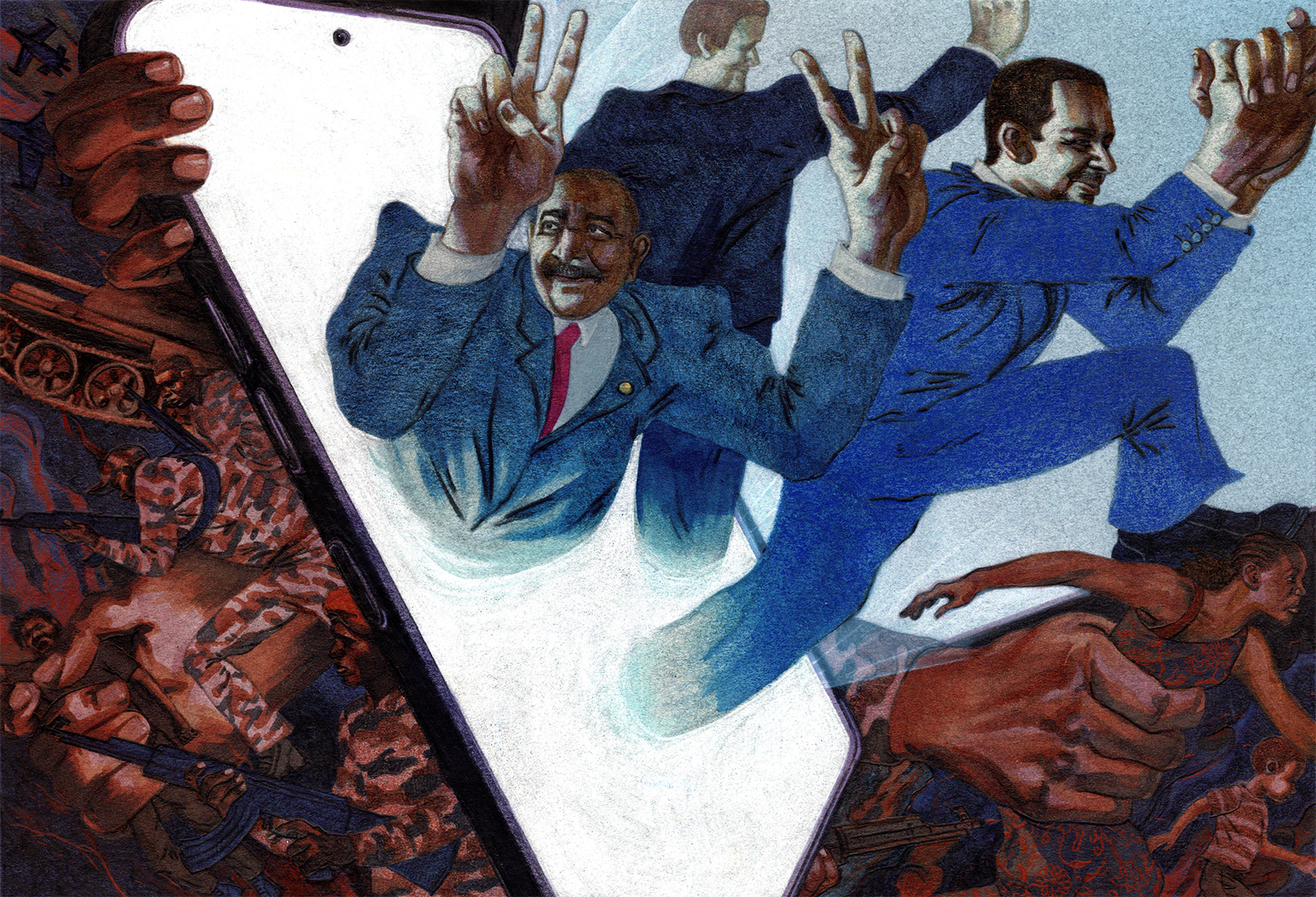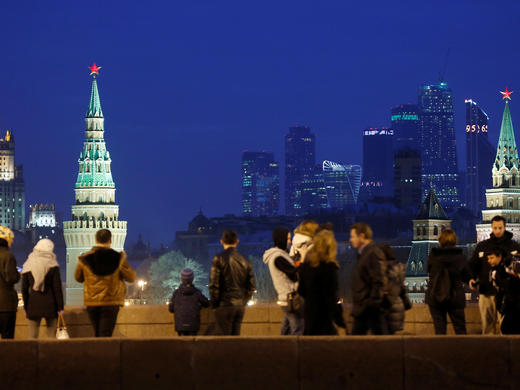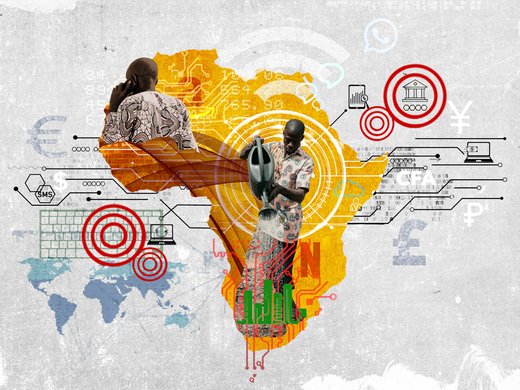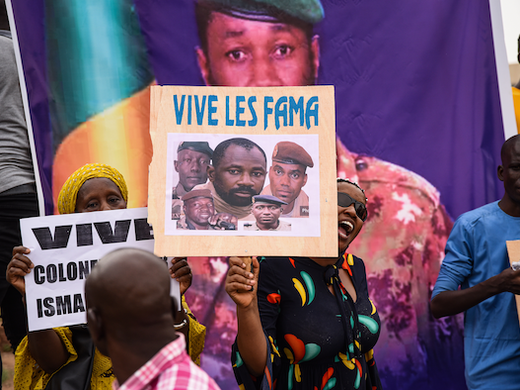Sudan has fallen into armed conflict under the leadership of two rival military factions. Fierce clashes since April 15 between the Sudanese Armed Forces (SAF), led by General Abdel Fattah al-Burhan, and the paramilitary Rapid Support Forces (RSF), led by General Mohamed Hamdan “Hemedti” Dagalo, have devastated the tripartite capital city of Khartoum, and other areas nationwide. Protracted violence now risks further destabilizing the region. It may also suspend Sudan’s development for years — unless international pressure can broker a lasting truce. Yet that notion is complicated by the web of foreign interests involved and the plethora of peace processes being initiated by both regional and international actors.
But at the heart of Sudan’s sudden conflict is a more subtle and nuanced offensive: as the two warlords vie for control of a state being torn apart, a propaganda battle is raging online. In an effort to win hearts and minds, the violence on the ground has been accompanied by a deluge of disinformation and fake news in Sudan’s digital public sphere. Both the warring sides have increased the volume of photos, videos, interviews and statements being circulated by their spokespeople and social media accounts. It’s an obvious attempt to whitewash their role in derailing Sudan’s transition to democracy.
These tactics will have a major impact on both military decision making and the eventual postwar transition. Indeed, the conflict’s trajectory will hinge on whether domestic, regional and international actors coalesce their support around one of the two competing warlords. Domestically, these choices may be determined by long-standing allegiances to either side, ethnic and religious sentiments, historical dynamics between Khartoum and its peripheral territories — or simply a choice of “lesser evil.” Regional and international actors, meanwhile, will weigh previous bilateral relations as well as current and future strategic interests.
More importantly, the outcome will be influenced by the perceived legitimacy and credibility of Burhan and Hemedti as political actors — both of whom, over the past four years, have used extensive digital propaganda to project false narratives of themselves as viable statesmen open to a democratic future for Sudan.
A Partnership of Convenience Turns to War
Before their bitter power struggle exploded in bloodshed, Burhan and Hemedti were partners in an uneasy alliance. Since April 2019 — after a popular revolution toppled Sudan’s long-time autocrat, former president Omar al-Bashir — the generals have used their positions atop their country’s transitional state to prevent democracy from taking hold in Sudan, a resource-rich and strategically located nation of some 45 million. Both men have presided over consistent, lethal crackdowns by their security forces against demonstrators protesting military rule.
The current disastrous falling-out between the two aspiring strongmen stems in particular from a UN-backed framework agreement signed last December with a faction of the Forces for Freedom and Change, a fragmented civil coalition. That deal called for many reforms, including that the RSF be integrated into SAF as one unified military under the control of the head of the armed forces. Burhan called for the changes to occur within two years; Hemedti lobbied for a 10-year timeline instead.
The draft agreement was intended to be finalized by early April of 2023 and would have initiated a two-year civilian-led transition, culminating in elections in 2025. Yet, a successful power-sharing agreement between the military, the RSF, and civilian groups has never been a tangible prospect. Both Burhan and Hemedti surely understood what awaited them if they handed authority to a civilian-led government — a loss of power, increased scrutiny of their vast economic networks and assets, and possible prosecution for war crimes. Hemedti’s power, in particular, depends on the RSF’s continuing existence as a paramilitary force parallel to, and outside, the confines of the state.
Therefore, by early 2023, security sector reform — a central provision of the framework agreement — set Burhan and Hemedti’s competing interests on a collision course that has now ignited civil war. Allies having turned to foes, they are using online propaganda to help fuel the ruinous standoff.
Since fighting broke out, Hemedti has relied on social media to polish his image as a responsible citizen and leader. For more than a month on Twitter, his personal account and that of the RSF have portrayed the paramilitaries as martyrs. Indeed, Hemedti’s first interview after clashes erupted emphasized the claim that Burhan’s army had fired the first shot, and that the RSF had only responded in self-defence.
Since then, a cacophony of daily statements and footage have attempted to rebrand the RSF as a pro-democracy group, committed to the principles of peace, freedom and justice, seeking a reset of the 2019 revolution. The sudden, new posting of content in English — whereas the RSF’s primary language of communication is Arabic — further indicates the group’s strategy of appealing to Western entities in the international community.
The RSF paramilitaries have also announced the creation of a so-called “hotline” on WhatsApp to connect residents in the territory it holds with humanitarian aid, and to help with evacuations. A specialized task force similar to a neighbourhood police watch has been created as well, with a stated mandate of protecting civilians from crime. These actions ring hollow indeed amid credible media reports quoting citizens in Khartoum, with accounts of RSF forces occupying and terrorizing their neighbourhoods with mass looting, theft, extortion and sexual assault. Trying to push back against the optics of having lost command and control of its own troops, the RSF’s leadership on May 13 issued a lengthy statement saying “our commitment to the rule of law is unwavering,” while vowing to hold its members accountable.
Meanwhile, Burhan, as leader of Sudan’s army and an ally of former president Bashir, has for years benefited from the pro-junta stance of the country’s state-dominated media ecosystem. This system includes many outlets owned by Bashir’s relatives and loyalists. During the 2019 revolution, multiple weeks-long internet shutdowns were imposed to cover up atrocities by members of the military, most notably the killing of at least 120 people at a sit-in protest in June of that year. Burhan has since successfully co-opted the major private telecommunications companies as well as Sudan’s communications regulator, the Telecommunications and Post Regulatory Authority, to implement state-sanctioned internet blackouts throughout the transitional period.
The military’s control of state media platforms extends to Sudan’s broadcasting and news agencies. The government-owned and operated Sudan National Broadcasting Corporation has aired very little information about the war, and what has been broadcast has been uncritical of the government. A military censor works with Sudan TV to make sure programs reflect government policy, which is being created in the absence of a functioning Cabinet and civil service.
Although privately owned, the Sudan News Agency (SUNA) has likewise exhibited a clear bias toward SAF, its coverage generally limited to congratulatory remarks and statements from the armed forces. For example, a May 9 statement from a SAF spokesperson published on the SUNA website called on the RSF “to stop persisting in the failed rebellion plot,” and minimizes the extent of the chaos: “The operational situation is stable in all states of the country, except for some clashes with rebel militia groups in some parts of the capital.”
Accessing impartial and independent information in Sudan has been a decades-long challenge given how the state has generally extended control over all domestic communication and media. Online news outlets from abroad, such as the Paris-based Sudan Tribune, have emerged in recent years to try to provide objective coverage of the country, which regularly ranks near the bottom of press freedom indices. However, the legacy of state media control is powerful, helping to drive false narratives and perceptions that underpin not only the military’s continued dominance of government but also the reputations of the two men vying to lead it.
Around the same time, Hemedti began trying to court local human rights activists, offering them large sums of money in the apparent hope that he’d receive credit for collaborating with Sudanese civil society.
Conjuring Up Political Legitimacy
Hemedti, an outcast among Khartoum elites because of his humble roots — before he gained notoriety as commander of the pro-Bashir Janjaweed militias, he was a cattle trader in the western region of Darfur — has been adept in lobbying domestic and international actors to alter his image. Almost immediately after Bashir was ousted in 2019, Hemedti paid $6 million to a Canadian lobbying firm based in Montreal, Dickens & Madson (Canada) Inc., to launch a charm offensive on behalf of Sudan’s interim government. The goal was to win over Western officials, including the Trump administration, as well as United Nations representatives and law makers elsewhere. The warlord-turned-politician clearly hoped that by generating international and domestic media coverage of these engagements, he’d bolster the credibility of Sudan’s new military leaders as legitimate and capable governors.
Around the same time, Hemedti began trying to court local human rights activists, offering them large sums of money in the apparent hope that he’d receive credit for collaborating with Sudanese civil society. At one point, Hemedti even orchestrated a deal to have the International Committee of the Red Cross provide training on humanitarian law to his fighters. Photos were posted on social media of RSF leaders signing an agreement with the aid organization.
Meanwhile, Burhan spent significant time outside Sudan, crafting an image of himself as the country’s de facto leader, in control of Sudan’s foreign policy. The army chief has regularly travelled to meet — and be photographed shaking hands with — world leaders and high-ranking officials. All this is dutifully reported by Sudanese state media and displayed on Burhan’s personal Wikipedia page. Since April 2019, the general has visited all of Sudan’s neighbours, and journeyed to Kenya, Russia, Türkiye, Uganda, and the Gulf countries of Qatar, Saudi Arabia and the United Arab Emirates.
But Burhan’s political legitimacy was fully cemented in late September 2022. Less than a year after launching a coup that would dissolve the joint military-civilian transitional administration set up in the wake of Bashir’s departure, he gave a speech to the United Nations General Assembly. This occurred three days after he’d attended the funeral of Queen Elizabeth II in London. These back-to-back high-profile international engagements helped erase the narrative of Burhan as a leader of an abusive military junta, and legitimized him as Sudan’s head of state.
Yet, the propaganda conflict was raging long before regional and international actors rubber-stamped the generals’ political legitimacy.
Several weeks prior to the October 2021 military takeover, Facebook released a report saying it had dismantled a network of nearly 1,000 online assets linked to the RSF for violating the platform’s policies on government interference. Facebook said the fake entities — accounts, pages and groups on Facebook, as well as Instagram profiles — were targeting domestic audiences by posing as freelancers, journalists and students in Sudan. The posts were mostly in Arabic, parroting RSF talking points and amplifying material from the paramilitary group’s own verified accounts. By the time the network was taken down, it had a combined reach of 1.1 million users in Sudan, across both Facebook and Instagram.
A deeper analysis of the network conducted by the Atlantic Council’s Digital Forensic Research Lab (DFR Lab) found telltale signs of coordinated disinformation. According to researchers, many of the most active accounts mirrored each other’s content, often with posts only minutes apart. Other actors portrayed themselves as legitimate news outlets, weaving pro-RSF material into feeds otherwise populated with posts of text copied verbatim from established media. Press releases from the transitional government — headed by Burhan, with Hemedti as his deputy — were also framed as breaking news, further bolstering pro-military narratives about the status of Sudan’s democratic transition.
Many of these tactics emulate disinformation methods pioneered by Russia in Africa as part of the Kremlin’s strategic pivot to the continent in recent years. Russia has developed strong ties with both Burhan and Hemedti, centred around the Kremlin’s desire to establish a Red Sea naval base at Port Sudan. Private military contractors from the Wagner Group — first established in 2014 as a proxy force for Russia’s land grabs in eastern Ukraine — are reportedly involved in sophisticated gold-smuggling activities in Sudan as well.
According to US officials, former president Omar al-Bashir first enlisted the private army in 2017 to help suppress the country’s nascent pro-democracy movement, in exchange for gold-mining licences and other lucrative business concessions to a subsidiary of a company owned by Wagner Group founder Yevgeny Prigozhin. A US Treasury Department statement in July 2020 alleges Wagner advisers advocated that the Bashir regime make use of “social media-enabled disinformation campaigns” akin to those used by the Internet Research Agency, a troll farm in St. Petersburg bankrolled by Prigozhin, that has sought to undermine Western democracies. Since then, clearly, the Wagner Group’s digital propaganda techniques have been adopted by Hemedti and the RSF for their own purposes.
By mid-2022, Hemedti’s campaign to launder his image was misfiring. Popular anger was on the rise and pro-democracy demonstrations against military rule were multiplying amid rising hunger and a cratering economy. At the same time, analysts suggested that Hemedti was becoming increasingly isolated from key power brokers within Sudan’s elite. By August 2022, he admitted to BBC Arabic that the October 2021 coup had failed to achieve its “desired outcomes.” This attempted course correction appears to have been an effort by Hemedti to distance his RSF from the coup. It also provided tacit recognition that Sudan’s militarized elites, led by Burhan, had elevated the former warlord to power in exchange for his help in violently suppressing pro-democracy protests.
Feeling the pressure, Hemedti reportedly contracted Zero Gravity, a multimedia software company based in Abu Dhabi, toward the end of 2022, to deploy a new communications strategy. The investigative platform Africa Intelligence reported in February of 2023 that he’d also sought the help of French public relations agency Think Doctor late in 2022, to obtain media training and help soften his image among European decision makers, as well as to manage the RSF’s Wikipedia page and various social media accounts.
New research from the DFR Lab suggests that at least 900 Twitter accounts may have recently been hijacked to support the RSF’s agenda in a last-ditch effort to sow an argument to delay Sudan’s democratic transition. Many of the accounts had been created by legitimate Twitter users but had been lying dormant for years. At the end of March — just prior to the deadline for finalizing the framework agreement — the avatars for some of these accounts were changed to generic photos seemingly unaligned with the gender identity reflected in their Twitter handles. These altered accounts soon began “liking” and retweeting posts from the RSF and Hemedti.
Deprive Alleged War Criminals of a Platform
Short-term policy actions are urgently needed to stem the flood of disinformation and propaganda propagated by Burhan, Hemedti and their warring loyalists. Most immediately, given the mounting evidence of human rights violations and breaches of international humanitarian law by both sides, regional and international news outlets must highlight how both generals now face credible allegations of war crimes — such as attacks on health facilities, blocking of aid access, and the use of civilians as human shields.
And while mediation and negotiation to resolve the crisis will necessarily include SAF and the RSF, the generals’ ability to broadcast their chosen narratives to a wide audience, particularly via Twitter, has lent them undue status and false legitimacy. Social media companies should suspend the RSF’s verified accounts and Hemedti’s personal accounts, while also monitoring for fake accounts linked to either camp.
A case in point: Valent Projects, a digital analytics agency, on May 29 released new findings detailing how 113 suspected bot accounts on Twitter, impersonating ordinary Sudanese citizens, are inflating perceptions of grassroots support for the SAF. In a matter of weeks, these accounts have posted in Arabic more than 6,000 times using the hashtag “One Army, One Nation,” often invoking key phrases such as “we are all the army” and “neutrality is treason.” Since the hashtag was first introduced, it has been adopted by an additional 2,150 users — a number that continues to grow.
In the medium to long term, Sudanese authorities will need to implement new frameworks and policies to counter disinformation and digital propaganda. These efforts should include reforming or repealing a decision in November 2020 by Sudan’s transitional administration to strengthen a Bashir-era cybercrime law against spreading false information online — legislation long dismissed by activists as cover for authorities to crack down on dissent.
In a postwar transitional arrangement, authorities should also weigh the advantages and disadvantages of privatizing Sudan’s state-owned media agencies. The country’s digital media ecosystem must be overhauled to allow for more impartial and independent domestic reporting. Doing so would require regional and international support, including technical expertise and financial aid.
Ultimately, both Burhan and Hemedti have shown they hold no legitimate authority at the helm of Sudan’s transitional ruling council. Any mediation that overlooks this and produces another power-sharing agreement will be futile. At the same time, allowing the generals’ competing digital propaganda campaigns to continue unchecked, while also misleading Sudan’s people about a conflict tearing their country apart, is unacceptable. It would be disastrous for a nation whose 2019 revolution was hailed as a ground-breaking step toward democracy, after decades of dictatorship.



